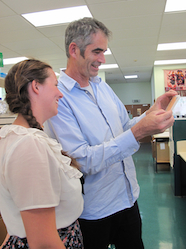Professor Parry Guilford is interviewed in the NZ Listener about cancer treatment, genomics and personalised medicine in advance of his 2014 Winter Series Lecture:
Cancer: Divide and conquer
Professor Guilford outlines the insights that have been gained into tumour behaviour that have altered how we respond to cancer as a disease. Whereas a tumour was considered to be a homogenous entity we now know that they are clonal. Tumour heterogeneity increases the complexity of treatment several fold. While one drug may knock out one part of a tumour, other parts may be entirely unaffected. Combinations of drugs are far more likely to succeed. While the complexity has soared however, we are no longer dealing with a black box.
Excerpt from the NZ Listener article: Game of clones
For Kiwis in the second half of their life, cancer risks and treatment options will continue to improve, but things are looking even better for Generations Y and beyond.
“I think the next generation need not get a cancer the way my generation does,” says Professor Parry Guilford.
We're entering a world of personalised medicine, says Guilford, of the Cancer Genetics Laboratory at the University of Otago. Increasingly, when a patient's tumour is analysed, it's at the genomic level, and doctors try to make predictions about how that tumour will respond to treatment...
Mark Broatch: Game of clones 26 June 2014, subscriber access only, NZ Listener website
Related Material
- Cancer: Divide and conquer Winter Lecture Series, venues: Wellington 6pm, 9 July (livestreamed) and Auckland 6pm, 10th July 2014.
- Personalised medicine

Professor Parry Guilford and PhD candidate Bryony Telford in the lab.
